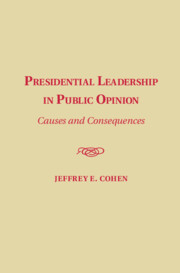Book contents
- Frontmatter
- Contents
- Figures
- Tables
- Acknowledgments
- 1 The Many Meanings of Presidential Leadership
- 2 Evidence of the Public Demand for Presidential Leadership
- 3 Congressional Sources of the President's Leadership Image
- 4 Success in Congress and Perceptions of Presidential Strength
- 5 Presidential Representation and Public Opinion
- 6 Presidential Leadership and Presidential Elections
- 7 Perceptions of Presidential Leadership, Trust in Government, and Attitudes toward Congress
- 8 Presidential Leadership, Public Opinion, and American Democracy
- Sources
- Index
8 - Presidential Leadership, Public Opinion, and American Democracy
Published online by Cambridge University Press: 05 May 2015
- Frontmatter
- Contents
- Figures
- Tables
- Acknowledgments
- 1 The Many Meanings of Presidential Leadership
- 2 Evidence of the Public Demand for Presidential Leadership
- 3 Congressional Sources of the President's Leadership Image
- 4 Success in Congress and Perceptions of Presidential Strength
- 5 Presidential Representation and Public Opinion
- 6 Presidential Leadership and Presidential Elections
- 7 Perceptions of Presidential Leadership, Trust in Government, and Attitudes toward Congress
- 8 Presidential Leadership, Public Opinion, and American Democracy
- Sources
- Index
Summary
There is probably no more common refrain among voters than the call for presidential leadership. For many, perhaps most voters, the president stands in the center of their political world. They view politics and policy making in terms of the president (and his allies) versus the president's competitors, rivals, opponents, etc. Not only do many voters organize these often confusing and complex political events with this presidential schema, they also rely on the president for psychological assurance in an often dangerous and threatening world (Greenstein 1974). Moreover, the unitary nature of the office personalizes the presidency to many voters. The news media reinforces the personalization of the office by the way it reports on the presidency. Thus, it is little wonder that voters seek leadership from their presidents. But what do voters mean when they say they want presidential leadership?
There is a considerable and well-established literature that suggests voters' expectations of presidents are idealized and contradictory (Cronin 1980; Cronin and Genovese 1998; Simon 2009). But there is another literature that looks at voter evaluation of incumbent presidents, a performance standard – most notably in the vast literature on presidential approval. This book extends the performance standard from approval to voters' perceptions of presidential leadership.
Despite their lofty and unrealistic idealized expectations for presidential leadership, voters desire that a sitting president be strong and representative. Presidential strength is an elusive and fuzzy concept, but as I have argued in this book, how often a president “wins” or “loses,” especially in his dealings with Congress, will have a large impact on whether voters view that president as strong or weak. This does not deny that there are many other arenas where voters can look to see if the president has won or lost, but, as argued here, perhaps the most important is the congressional arena.
- Type
- Chapter
- Information
- Presidential Leadership in Public OpinionCauses and Consequences, pp. 181 - 190Publisher: Cambridge University PressPrint publication year: 2015



